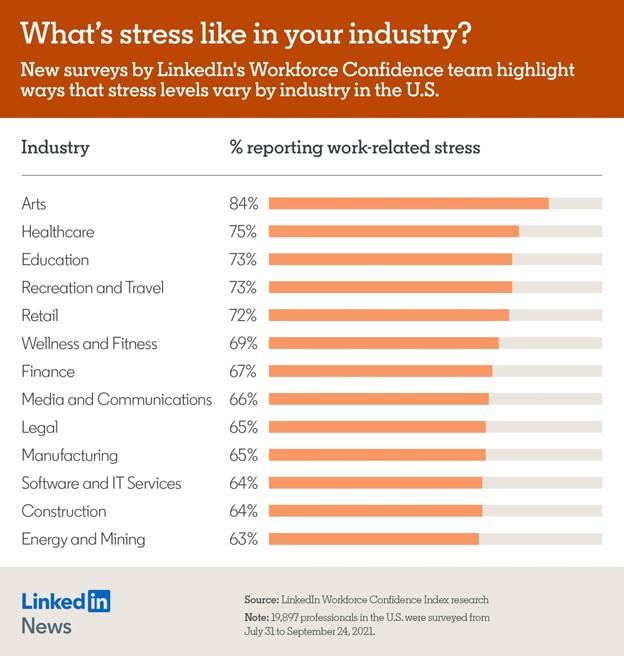Construction Workers’ Stress: 'Hectic but Thriving'
Originally Published by: LinkedIn — October 6, 2021
SBCA appreciates your input; please email us if you have any comments or corrections to this article.
The latest edition of LinkedIn’s Workforce Confidence survey highlights the different faces of stress across the U.S. economy. These findings span nearly two dozen industries. They are based on polling of 19,897 LinkedIn members from July 31 through September 24. Below are the results:

As the chart above shows, stress levels correlate closely with where you work. COVID-related restrictions have been most disruptive in industries where indoor, face-to-face contact is the norm. That’s reflected by the fact that in fields such as healthcare, education or recreation and travel, stress levels are highest.
Stress is noticeably lower in fields where it’s easier to work from home or in other remote settings. These include finance, media, software and information-technology services. And stress levels might be slightly lower still (subject to margin-of-error statistical considerations) in fields such as construction, energy or mining, where outdoor work is the norm.
The Workforce Confidence analysis digs even deeper, though. It analyzes the ways that different types of stress vary across industries. COVID concerns are an important part of the picture, but so, too, are worries related to insufficient income -- or an overload of tasks that must get done.
Analyzing the interplay of all these factors, LinkedIn market research expert Alexandra Gunther has identified seven distinct stress profiles that define the full sweep of U.S. industries. They are:
- High risk; low reward
- Overwhelming but safe
- Overwhelming and dangerous
- Tight on money
- Low to moderate stress
- Fair work with some risk
- Hectic but thriving
Looking specifically at “Hectic but thriving”: This is the land of boots and bytes. Three physically taxing industries are clustered here: construction and manufacturing, along with energy and mining. They’re joined by two types of knowledge-based tech work: software and IT services, as well as hardware and networking.
In all these areas, work-related COVID concerns are rare, while jitters about pay are -- shall we say -- not a problem. Respondents do express concern about not having enough time to get everything done, with that concern being especially intense in construction (42%).

